University Assignment: Import Export Theory - Detailed Analysis
VerifiedAdded on 2022/09/23
|6
|882
|32
Homework Assignment
AI Summary
This assignment solution addresses key aspects of import export theory. It begins by outlining five critical factors in selecting a transport model, including cost, reliability, safety, and the nature of goods. The solution then explores the roles and benefits of freight forwarders, detailing their functions in advising on costs, determining routes, and handling documentation. Finally, the assignment examines the classification and handling of dangerous goods in transport, referencing departmental regulations and highlighting the responsibilities of forwarders in ensuring proper marking, labeling, and documentation. The solution includes a reference to the BIFA guide on handling dangerous goods.
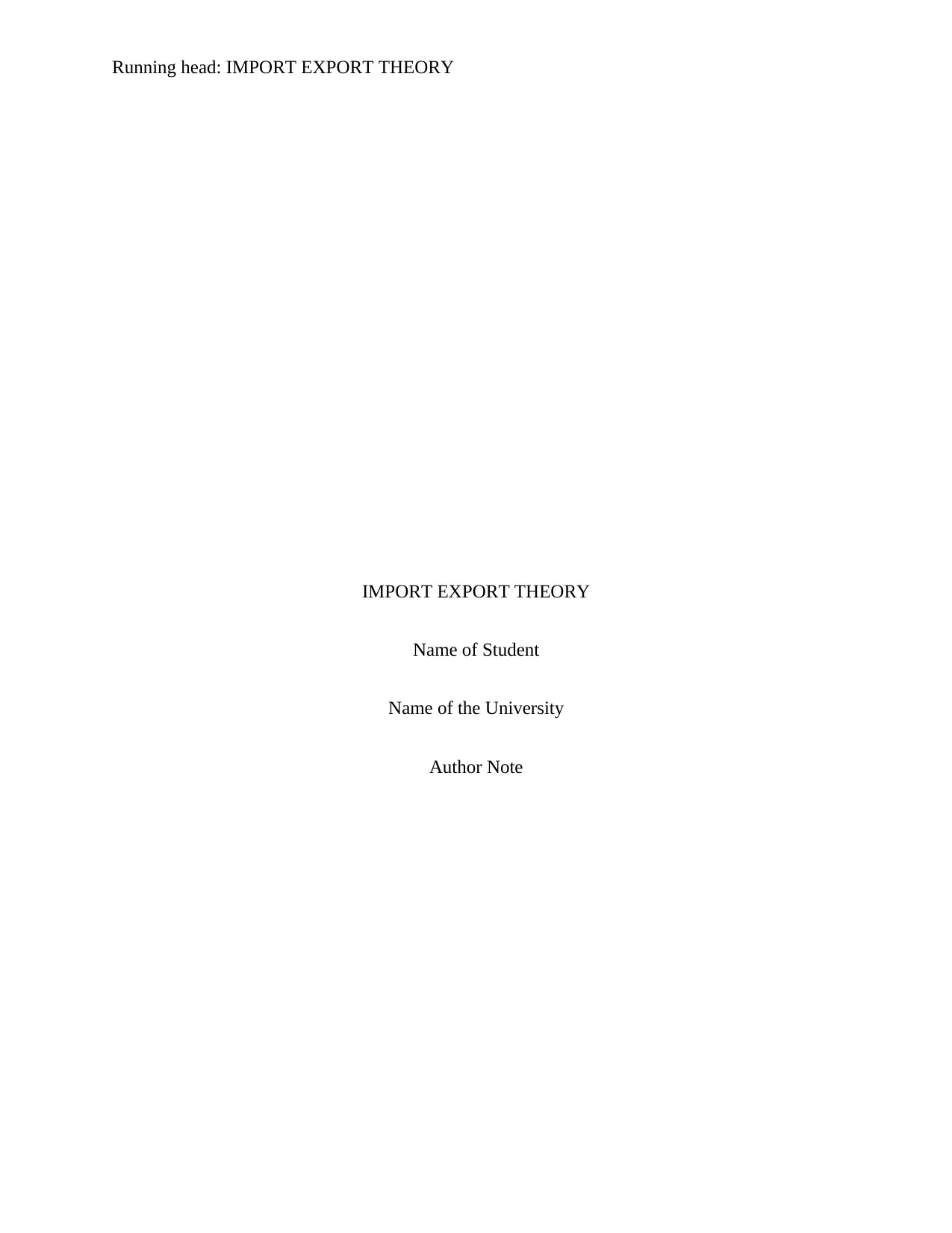
Running head: IMPORT EXPORT THEORY
IMPORT EXPORT THEORY
Name of Student
Name of the University
Author Note
IMPORT EXPORT THEORY
Name of Student
Name of the University
Author Note
Paraphrase This Document
Need a fresh take? Get an instant paraphrase of this document with our AI Paraphraser
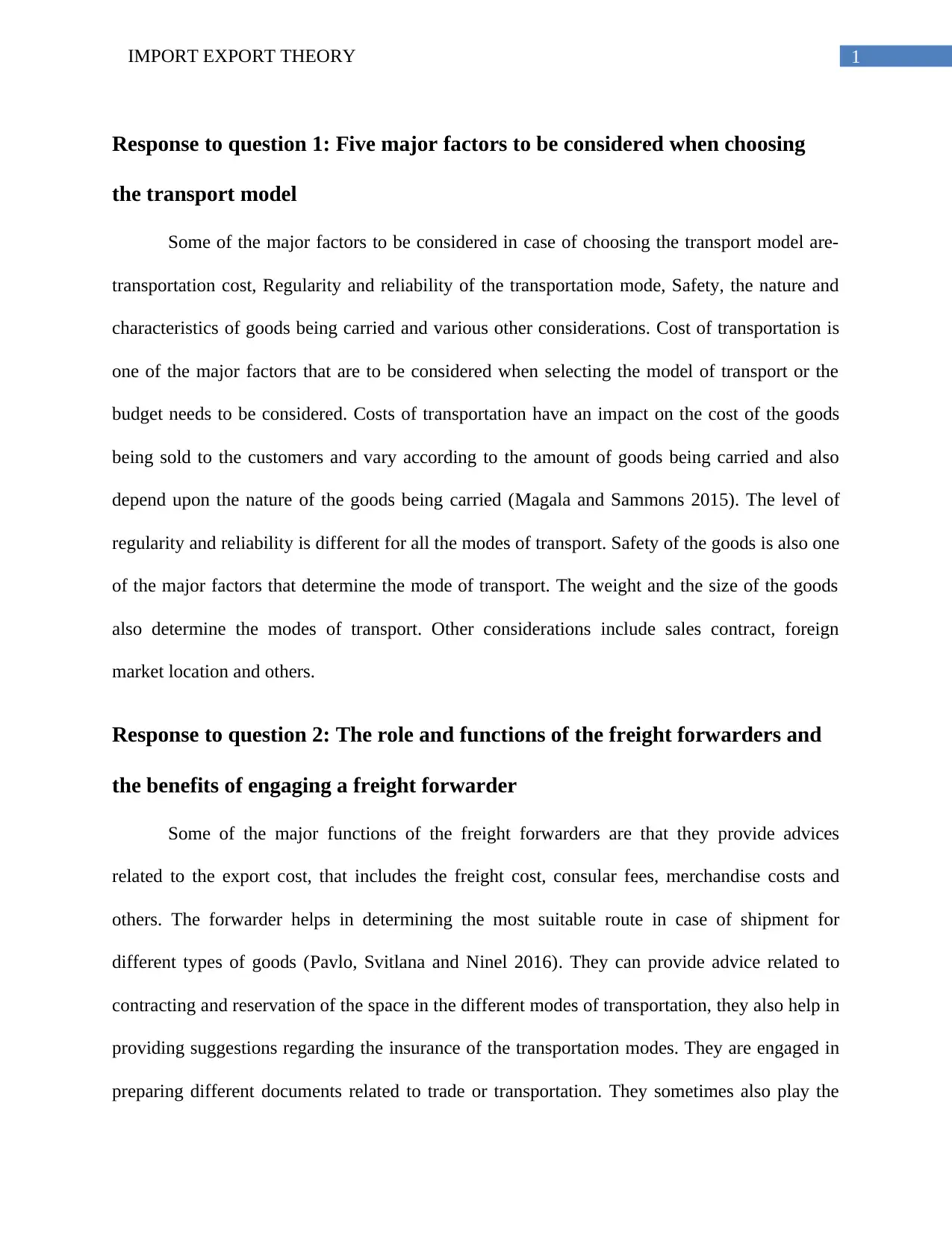
1IMPORT EXPORT THEORY
Response to question 1: Five major factors to be considered when choosing
the transport model
Some of the major factors to be considered in case of choosing the transport model are-
transportation cost, Regularity and reliability of the transportation mode, Safety, the nature and
characteristics of goods being carried and various other considerations. Cost of transportation is
one of the major factors that are to be considered when selecting the model of transport or the
budget needs to be considered. Costs of transportation have an impact on the cost of the goods
being sold to the customers and vary according to the amount of goods being carried and also
depend upon the nature of the goods being carried (Magala and Sammons 2015). The level of
regularity and reliability is different for all the modes of transport. Safety of the goods is also one
of the major factors that determine the mode of transport. The weight and the size of the goods
also determine the modes of transport. Other considerations include sales contract, foreign
market location and others.
Response to question 2: The role and functions of the freight forwarders and
the benefits of engaging a freight forwarder
Some of the major functions of the freight forwarders are that they provide advices
related to the export cost, that includes the freight cost, consular fees, merchandise costs and
others. The forwarder helps in determining the most suitable route in case of shipment for
different types of goods (Pavlo, Svitlana and Ninel 2016). They can provide advice related to
contracting and reservation of the space in the different modes of transportation, they also help in
providing suggestions regarding the insurance of the transportation modes. They are engaged in
preparing different documents related to trade or transportation. They sometimes also play the
Response to question 1: Five major factors to be considered when choosing
the transport model
Some of the major factors to be considered in case of choosing the transport model are-
transportation cost, Regularity and reliability of the transportation mode, Safety, the nature and
characteristics of goods being carried and various other considerations. Cost of transportation is
one of the major factors that are to be considered when selecting the model of transport or the
budget needs to be considered. Costs of transportation have an impact on the cost of the goods
being sold to the customers and vary according to the amount of goods being carried and also
depend upon the nature of the goods being carried (Magala and Sammons 2015). The level of
regularity and reliability is different for all the modes of transport. Safety of the goods is also one
of the major factors that determine the mode of transport. The weight and the size of the goods
also determine the modes of transport. Other considerations include sales contract, foreign
market location and others.
Response to question 2: The role and functions of the freight forwarders and
the benefits of engaging a freight forwarder
Some of the major functions of the freight forwarders are that they provide advices
related to the export cost, that includes the freight cost, consular fees, merchandise costs and
others. The forwarder helps in determining the most suitable route in case of shipment for
different types of goods (Pavlo, Svitlana and Ninel 2016). They can provide advice related to
contracting and reservation of the space in the different modes of transportation, they also help in
providing suggestions regarding the insurance of the transportation modes. They are engaged in
preparing different documents related to trade or transportation. They sometimes also play the
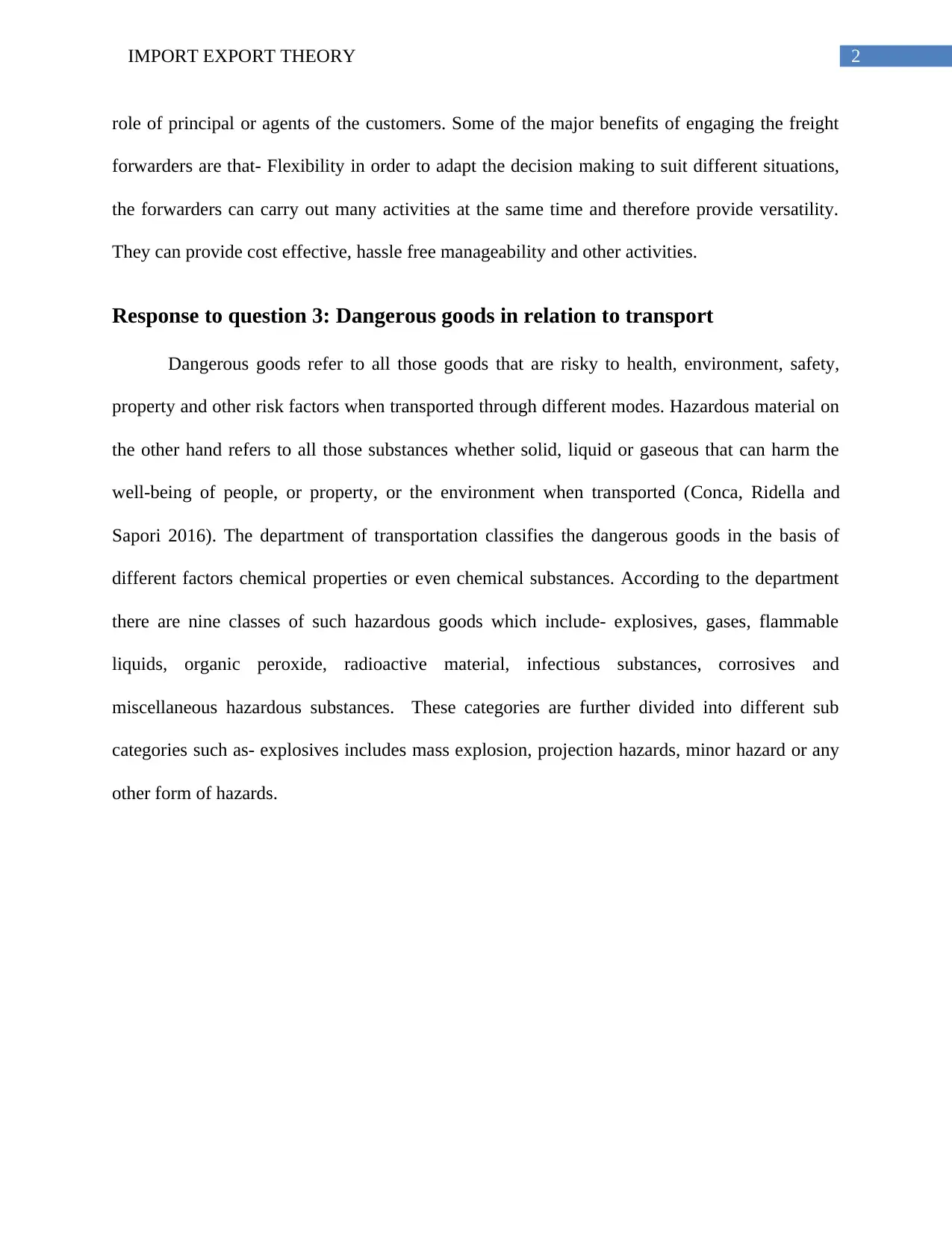
2IMPORT EXPORT THEORY
role of principal or agents of the customers. Some of the major benefits of engaging the freight
forwarders are that- Flexibility in order to adapt the decision making to suit different situations,
the forwarders can carry out many activities at the same time and therefore provide versatility.
They can provide cost effective, hassle free manageability and other activities.
Response to question 3: Dangerous goods in relation to transport
Dangerous goods refer to all those goods that are risky to health, environment, safety,
property and other risk factors when transported through different modes. Hazardous material on
the other hand refers to all those substances whether solid, liquid or gaseous that can harm the
well-being of people, or property, or the environment when transported (Conca, Ridella and
Sapori 2016). The department of transportation classifies the dangerous goods in the basis of
different factors chemical properties or even chemical substances. According to the department
there are nine classes of such hazardous goods which include- explosives, gases, flammable
liquids, organic peroxide, radioactive material, infectious substances, corrosives and
miscellaneous hazardous substances. These categories are further divided into different sub
categories such as- explosives includes mass explosion, projection hazards, minor hazard or any
other form of hazards.
role of principal or agents of the customers. Some of the major benefits of engaging the freight
forwarders are that- Flexibility in order to adapt the decision making to suit different situations,
the forwarders can carry out many activities at the same time and therefore provide versatility.
They can provide cost effective, hassle free manageability and other activities.
Response to question 3: Dangerous goods in relation to transport
Dangerous goods refer to all those goods that are risky to health, environment, safety,
property and other risk factors when transported through different modes. Hazardous material on
the other hand refers to all those substances whether solid, liquid or gaseous that can harm the
well-being of people, or property, or the environment when transported (Conca, Ridella and
Sapori 2016). The department of transportation classifies the dangerous goods in the basis of
different factors chemical properties or even chemical substances. According to the department
there are nine classes of such hazardous goods which include- explosives, gases, flammable
liquids, organic peroxide, radioactive material, infectious substances, corrosives and
miscellaneous hazardous substances. These categories are further divided into different sub
categories such as- explosives includes mass explosion, projection hazards, minor hazard or any
other form of hazards.
⊘ This is a preview!⊘
Do you want full access?
Subscribe today to unlock all pages.

Trusted by 1+ million students worldwide
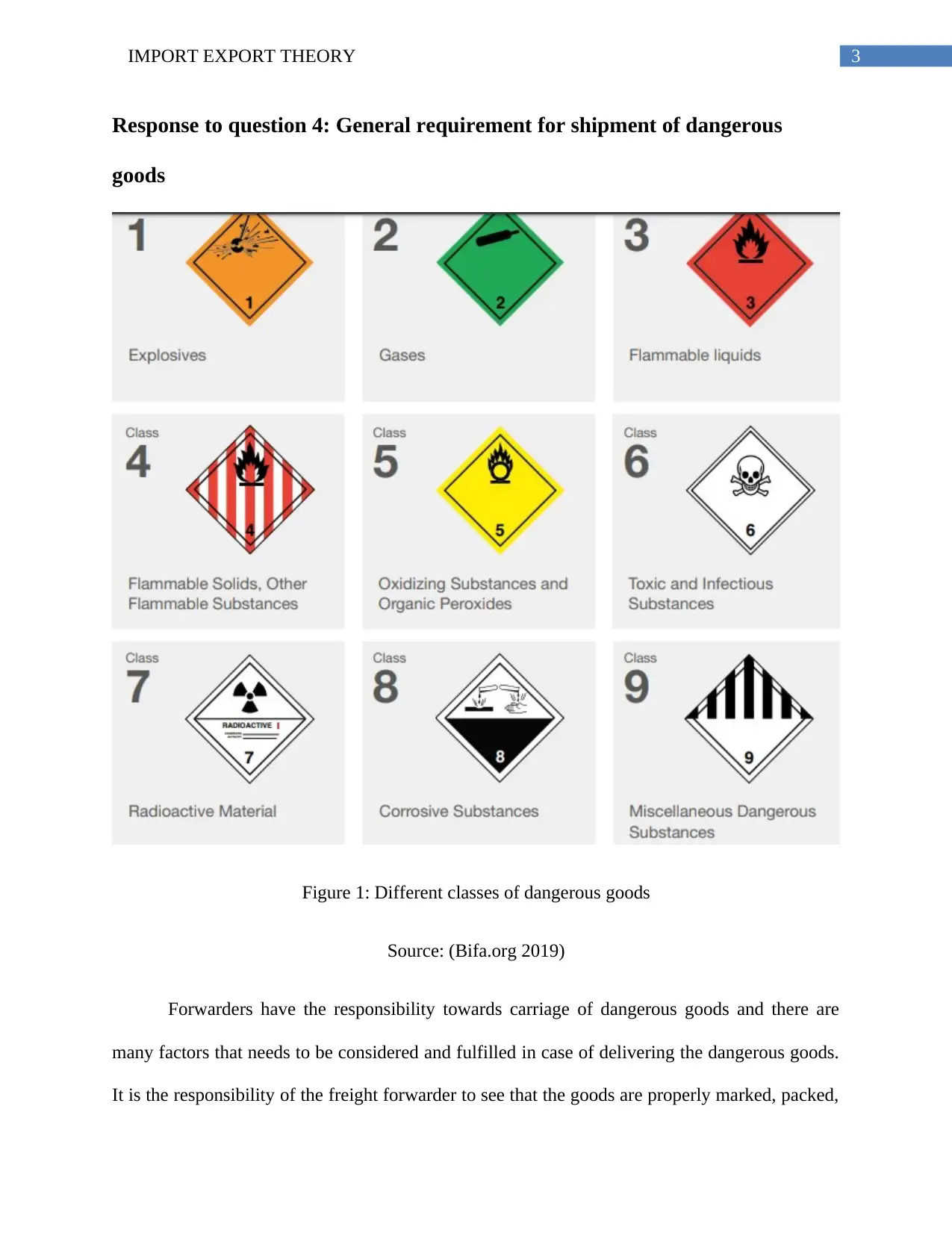
3IMPORT EXPORT THEORY
Response to question 4: General requirement for shipment of dangerous
goods
Figure 1: Different classes of dangerous goods
Source: (Bifa.org 2019)
Forwarders have the responsibility towards carriage of dangerous goods and there are
many factors that needs to be considered and fulfilled in case of delivering the dangerous goods.
It is the responsibility of the freight forwarder to see that the goods are properly marked, packed,
Response to question 4: General requirement for shipment of dangerous
goods
Figure 1: Different classes of dangerous goods
Source: (Bifa.org 2019)
Forwarders have the responsibility towards carriage of dangerous goods and there are
many factors that needs to be considered and fulfilled in case of delivering the dangerous goods.
It is the responsibility of the freight forwarder to see that the goods are properly marked, packed,
Paraphrase This Document
Need a fresh take? Get an instant paraphrase of this document with our AI Paraphraser
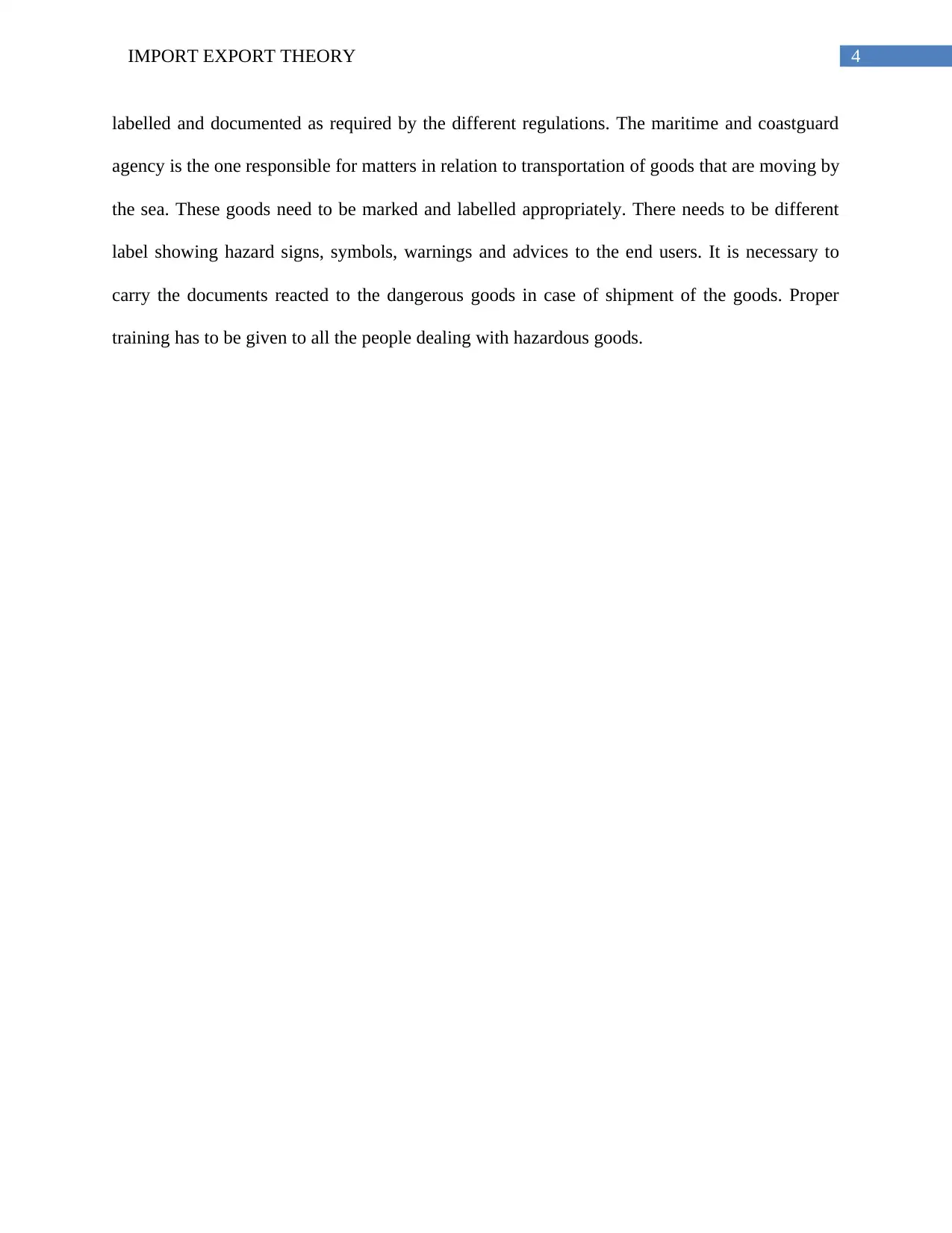
4IMPORT EXPORT THEORY
labelled and documented as required by the different regulations. The maritime and coastguard
agency is the one responsible for matters in relation to transportation of goods that are moving by
the sea. These goods need to be marked and labelled appropriately. There needs to be different
label showing hazard signs, symbols, warnings and advices to the end users. It is necessary to
carry the documents reacted to the dangerous goods in case of shipment of the goods. Proper
training has to be given to all the people dealing with hazardous goods.
labelled and documented as required by the different regulations. The maritime and coastguard
agency is the one responsible for matters in relation to transportation of goods that are moving by
the sea. These goods need to be marked and labelled appropriately. There needs to be different
label showing hazard signs, symbols, warnings and advices to the end users. It is necessary to
carry the documents reacted to the dangerous goods in case of shipment of the goods. Proper
training has to be given to all the people dealing with hazardous goods.
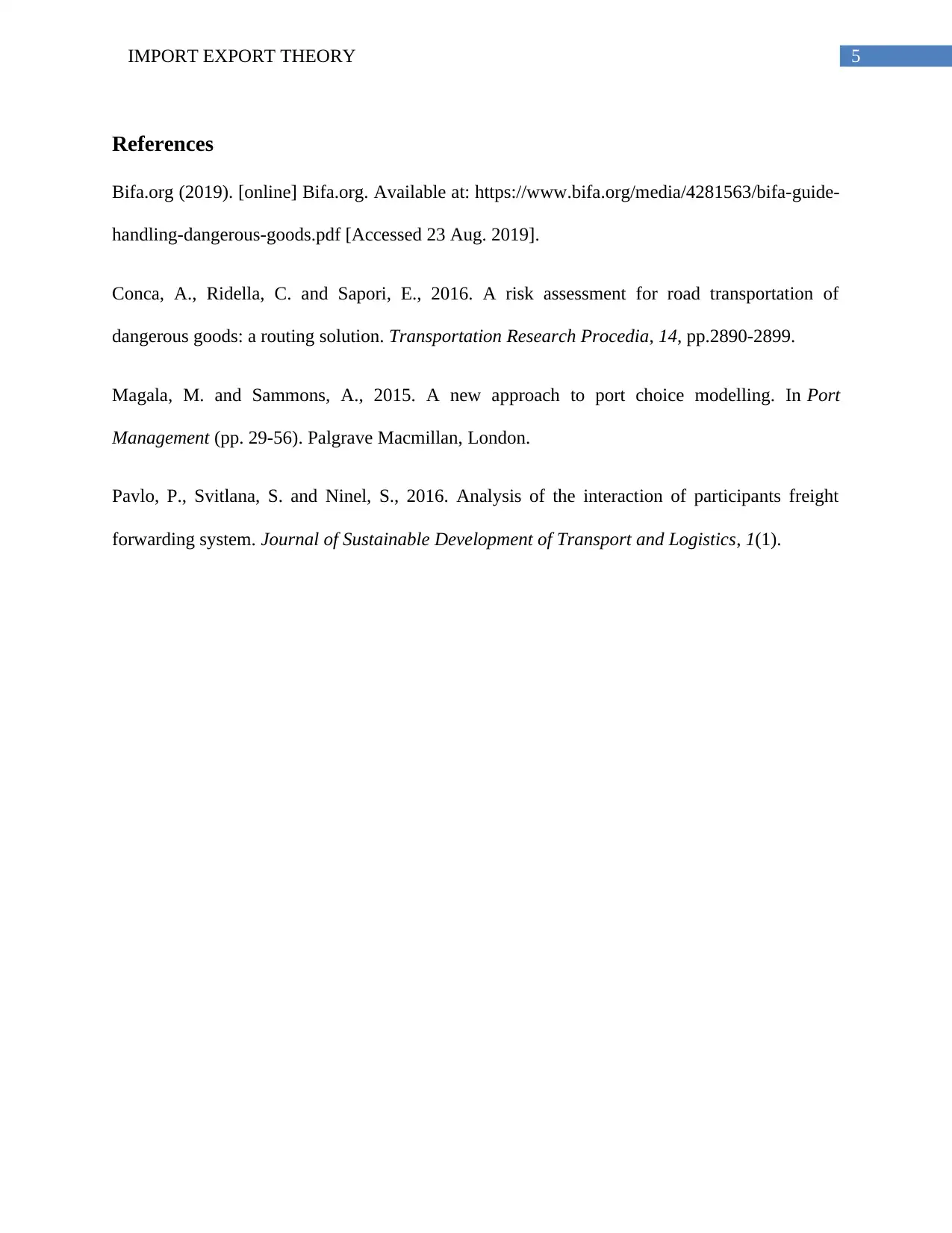
5IMPORT EXPORT THEORY
References
Bifa.org (2019). [online] Bifa.org. Available at: https://www.bifa.org/media/4281563/bifa-guide-
handling-dangerous-goods.pdf [Accessed 23 Aug. 2019].
Conca, A., Ridella, C. and Sapori, E., 2016. A risk assessment for road transportation of
dangerous goods: a routing solution. Transportation Research Procedia, 14, pp.2890-2899.
Magala, M. and Sammons, A., 2015. A new approach to port choice modelling. In Port
Management (pp. 29-56). Palgrave Macmillan, London.
Pavlo, P., Svitlana, S. and Ninel, S., 2016. Analysis of the interaction of participants freight
forwarding system. Journal of Sustainable Development of Transport and Logistics, 1(1).
References
Bifa.org (2019). [online] Bifa.org. Available at: https://www.bifa.org/media/4281563/bifa-guide-
handling-dangerous-goods.pdf [Accessed 23 Aug. 2019].
Conca, A., Ridella, C. and Sapori, E., 2016. A risk assessment for road transportation of
dangerous goods: a routing solution. Transportation Research Procedia, 14, pp.2890-2899.
Magala, M. and Sammons, A., 2015. A new approach to port choice modelling. In Port
Management (pp. 29-56). Palgrave Macmillan, London.
Pavlo, P., Svitlana, S. and Ninel, S., 2016. Analysis of the interaction of participants freight
forwarding system. Journal of Sustainable Development of Transport and Logistics, 1(1).
⊘ This is a preview!⊘
Do you want full access?
Subscribe today to unlock all pages.

Trusted by 1+ million students worldwide
1 out of 6
Related Documents
Your All-in-One AI-Powered Toolkit for Academic Success.
+13062052269
info@desklib.com
Available 24*7 on WhatsApp / Email
![[object Object]](/_next/static/media/star-bottom.7253800d.svg)
Unlock your academic potential
Copyright © 2020–2026 A2Z Services. All Rights Reserved. Developed and managed by ZUCOL.





